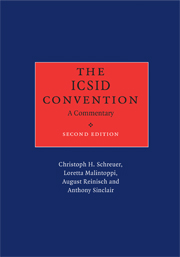Book contents
- Frontmatter
- Contents
- Foreword by Professor Sir Elihu Lauterpacht, CBE, QC
- Authors' preface to the second edition
- Table of cases
- List of abbreviations
- Text of the ICSID Convention
- Procedural calendar
- PREAMBLE
- CHAPTER I International Centre for Settlement of Investment Disputes
- CHAPTER II Jurisdiction of the Centre
- CHAPTER III Conciliation
- CHAPTER IV Arbitration
- CHAPTER V Replacement and Disqualification of Conciliators and Arbitrators
- CHAPTER VI Cost of Proceedings
- CHAPTER VII Place of Proceedings
- CHAPTER VIII Disputes between Contracting States
- CHAPTER IX Amendment
- CHAPTER X Final Provisions
- Article 67 Signature
- Article 68 Ratification and Entry into Force
- Article 69 Implementing Legislation
- Article 70 Territorial Application
- Article 71 Denunciation
- Article 72 Continuing Effect of Consent
- Article 73 Depositary
- Article 74 Registration
- Article 75 Notifications by Depositary
- Final Clause
- Consolidated bibliography
- Index by article
- Index by subject
Article 71 - Denunciation
from CHAPTER X - Final Provisions
Published online by Cambridge University Press: 07 September 2010
- Frontmatter
- Contents
- Foreword by Professor Sir Elihu Lauterpacht, CBE, QC
- Authors' preface to the second edition
- Table of cases
- List of abbreviations
- Text of the ICSID Convention
- Procedural calendar
- PREAMBLE
- CHAPTER I International Centre for Settlement of Investment Disputes
- CHAPTER II Jurisdiction of the Centre
- CHAPTER III Conciliation
- CHAPTER IV Arbitration
- CHAPTER V Replacement and Disqualification of Conciliators and Arbitrators
- CHAPTER VI Cost of Proceedings
- CHAPTER VII Place of Proceedings
- CHAPTER VIII Disputes between Contracting States
- CHAPTER IX Amendment
- CHAPTER X Final Provisions
- Article 67 Signature
- Article 68 Ratification and Entry into Force
- Article 69 Implementing Legislation
- Article 70 Territorial Application
- Article 71 Denunciation
- Article 72 Continuing Effect of Consent
- Article 73 Depositary
- Article 74 Registration
- Article 75 Notifications by Depositary
- Final Clause
- Consolidated bibliography
- Index by article
- Index by subject
Summary
Starting with the Preliminary Draft, all drafts to the Convention provided for denunciation (History, Vol. I, p. 300). The debates show that denunciation was envisaged primarily for States that objected to an amendment (History, Vol. II, pp. 357, 442, 534/5, 536). But Mr. Broches pointed out that the right to withdraw from the Convention was unconditional and could be exercised by a State at any time and without giving any reason (at pp. 534/5). The requirement under Art. 66(1) that an amendment be ratified by all Contracting States makes this ground for denunciation otiose. There was also some debate as to whether a denunciation should be subject to a waiting period (at p. 536) and to whom the notice should be addressed (at pp. 1007–1009).
A notice of denunciation has to be addressed to the World Bank which, under Art. 73, is the depositary of the Convention. The depositary has to notify all signatory States of a notice of denunciation in accordance with Art. 75(f).
On 2 May 2007, the World Bank received a written notice of denunciation of the Convention from the Republic of Bolivia. The denunciation took effect six months after the receipt of Bolivia's notice on 3 November 2007. In its capacity as the depositary of the ICSID Convention, the World Bank notified all ICSID signatory States of Bolivia's denunciation of the ICSID Convention.
- Type
- Chapter
- Information
- The ICSID ConventionA Commentary, pp. 1278Publisher: Cambridge University PressPrint publication year: 2009



